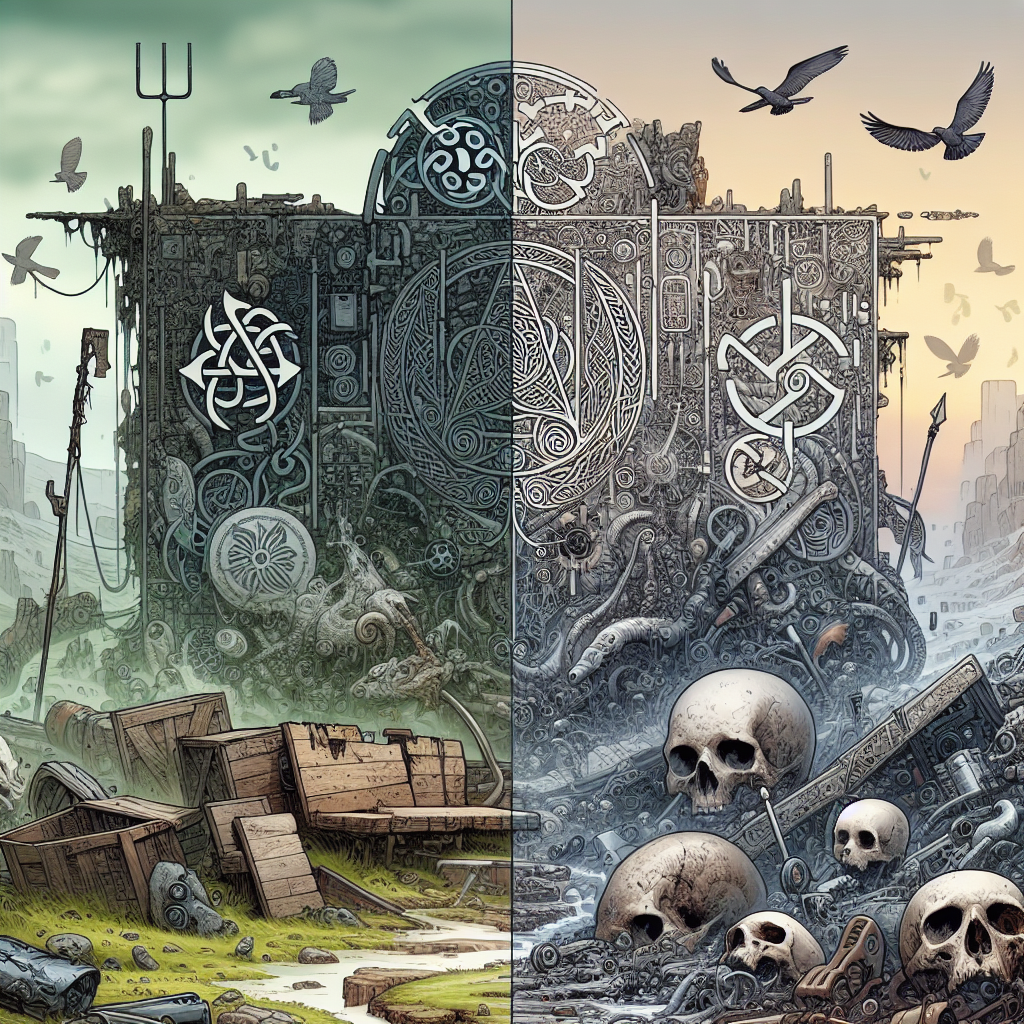Existentialism and religious views offer contrasting perspectives on the topic of death. Existentialism, rooted in philosophical beliefs, focuses on the individual’s existence, choices, and self-determination. In contrast, religious views incorporate beliefs in an afterlife, divine judgment, and the immortality of the soul. Understanding the differences and similarities between these two frameworks can shed light on our existential and spiritual dimensions when contemplating the inevitable end of life.
Key Takeaways:
- Existentialism emphasizes individual autonomy, self-determination, and authentic existence.
- Religious views often incorporate belief in an afterlife, divine judgment, and the immortality of the soul.
- Existentialism and religious views provide contrasting perspectives on coping with death.
- End-of-life beliefs and practices are influenced by philosophical frameworks.
- Understanding different perspectives on death can broaden our understanding of the human experience.
Awareness of Death in Existentialism
The philosophical framework of existentialism places significant emphasis on the awareness of death and its impact on human existence. Existentialist thinkers like Martin Heidegger and Karl Jaspers delve into the profound significance of death, urging individuals to confront their mortality and grapple with the existential questions it raises.
Martin Heidegger, one of the key figures in existentialism, argues that an authentic understanding of death is essential for living an authentic life. He believes that by confronting the reality of death, individuals gain a deeper appreciation for their existence and are encouraged to make meaningful choices. Heidegger’s concept of “being-towards-death” emphasizes the temporal nature of human life and the need to live in alignment with one’s true self.
Karl Jaspers, another influential existentialist philosopher, explores the idea of death as a boundary situation that highlights humanity’s finitude. Jaspers emphasizes the importance of acknowledging our mortality in order to fully understand our existence and transcend beyond the empirical self. By facing the reality of death, individuals are pushed to reflect on their lives and strive for authenticity in their being.
Table: Contrasting Perspectives on Death in Existentialism
| Philosopher | Key Ideas |
|---|---|
| Martin Heidegger | Authentic existence involves confronting death and making choices aligned with one’s true self. |
| Karl Jaspers | Death is a boundary situation that prompts individuals to reflect on their lives and transcend their empirical self. |
By embracing the awareness of death, existentialism seeks to shed light on the significance of human existence and encourage individuals to live authentically. The recognition of mortality serves as a catalyst for self-reflection, personal growth, and the pursuit of meaning in life.
Religious Views on Death
Religious views on death encompass a diverse range of beliefs and perspectives. Across different traditions and belief systems, death is often seen as holding significant spiritual and existential significance. Central to many religious views is the belief in the existence of the soul and the idea that death marks a transition to another form of existence, such as the afterlife.
In religious traditions that embrace the concept of the afterlife, there are varying conceptions of what this existence entails. For example, some religions believe in the immortality of the soul, where the soul continues to exist in another realm after death. Others emphasize the idea of resurrection, where the body and soul are reunited, and individuals experience a physical existence in the afterlife.
Related to the concept of the afterlife is the belief in divine judgment. Many religious views hold that after death, individuals will be judged based on their actions and their faith. This judgment determines their ultimate destination, which may include experiences of heaven, hell, or other realms associated with their religious beliefs.
| Religious Beliefs | Existence After Death | Concepts |
|---|---|---|
| Christianity | Belief in eternal life through faith in Jesus Christ | Heaven, hell, resurrection, divine judgment |
| Islam | Belief in an afterlife of paradise or hell based on deeds in life | Jannah (paradise), Jahannam (hell), Day of Judgment |
| Hinduism | Belief in reincarnation and the cycle of birth and death | Karma, moksha, samsara |
These diverse religious views on death provide individuals with a framework for understanding and navigating the existential questions and fears associated with mortality. They offer a sense of hope, purpose, and guidance, as well as rituals and practices to cope with the inevitable reality of death.
The Concept of Death in Existentialism
In the realm of existentialism, philosopher Martin Heidegger conducted an ontological inquiry into the concept of death. Heidegger argued that death is not merely a biological event, but rather holds profound existential significance for human beings. He distinguishes between authentic and inauthentic modes of being in relation to death, exploring concepts like dread, existential freedom, and the existential conception of death.
Central to Heidegger’s philosophy is the idea of Dasein, which refers to the existence of human beings as beings-in-the-world. Heidegger posits that understanding death is essential for grasping the true essence of being and living authentically. It is through the awareness of our own mortality that we are compelled to confront the finitude of existence and make meaningful choices that align with our individual values and aspirations.
The Authentic Being in the Face of Death
A key aspect of Heidegger’s concept of death is the notion of authentic being. He argues that many individuals live in an inauthentic state, avoiding the contemplation of death and failing to fully engage with the existential questions it raises. In this state, people are distracted by everyday concerns and societal expectations, avoiding the confrontation of their own mortality.
In contrast, authentic being involves embracing the reality of death and recognizing its significance in shaping our existence. This perspective encourages individuals to live fully and consciously, making deliberate choices aligned with our own values and beliefs. Heidegger suggests that by confronting the inevitability of death, we can cultivate a sense of meaning, purpose, and existential freedom in our lives.
Existential Freedom and Dread in the Face of Mortality
Heidegger’s conception of death also explores the interplay between existential freedom and dread. While the awareness of death can evoke feelings of anxiety and dread, Heidegger argues that it also serves as a catalyst for existential freedom. The recognition of our mortality reveals the urgency and preciousness of our existence, prompting us to confront life’s fundamental questions and make choices that align with our true selves.
This confrontation with mortality can be unsettling, but it also opens up possibilities for personal growth and self-discovery. Embracing the existential freedom that arises from acknowledging our finitude allows us to shape our lives authentically and embrace the unique opportunities and challenges that come our way.
The Notion of Death in Religious Views
In religious views, the notion of death is explored within the context of Existenz and transcendence. Philosopher Karl Jaspers delves into the significance of death as a boundary situation, marking the end of human being-in-the-world. He distinguishes between Dasein, which refers to empirical self, and Existenz, which emphasizes the transcendent dimension of human existence. This distinction highlights the temporal nature of life and the existential questions raised by the inevitability of death.
Within religious frameworks, death is seen as a transformative event that leads to a new mode of being. It is often believed that the soul continues to exist beyond death, and religious teachings offer different interpretations of what awaits individuals in the afterlife. Concepts such as heaven, hell, resurrection, and judgment play a crucial role in shaping religious views on death and the notion of existence beyond earthly life.
Exploring the notion of death in religious views allows for a deeper understanding of the human experience and the search for meaning in life. It raises profound questions about the nature of being, the purpose of existence, and the relationship between the temporal and transcendent dimensions of human existence. By contemplating death within the context of religious beliefs, individuals are encouraged to reflect on the ultimate significance of their lives and the potential for transcendence beyond mortal boundaries.

Table: The Notion of Death in Religious Views
| Concepts | Explanation |
|---|---|
| Existenz | Refers to the transcendent dimension of human existence |
| Dasein | Refers to the empirical self and its being-in-the-world |
| Afterlife | Belief in the continuation of existence after death, with varying interpretations across religious traditions |
| Heaven and Hell | Concepts representing different states of existence in the afterlife, often associated with rewards or punishments based on one’s actions in life |
| Resurrection | Belief in the revival of the body or soul after death, typically associated with divine intervention |
| Judgment | Belief in a divine judgment that determines the fate of individuals after death, based on their actions and beliefs |
Existentialism vs Religion on the Meaning of Life
One of the fundamental differences between existentialism and religious views is their contrasting perspectives on the meaning of life. Existentialism places a strong emphasis on individual autonomy and self-determination in creating meaning and purpose. According to existentialist philosophy, individuals have the freedom to define the meaning of their own lives through their choices, actions, and experiences. It is through self-reflection and the pursuit of personal goals that existentialists believe individuals can find meaning and purpose in their existence.
On the other hand, religious beliefs often attribute meaning and purpose to divine guidance. Religious views hold that the ultimate purpose of life is to fulfill a specific divine plan or to serve a higher power’s will. According to religious teachings, individuals can find meaning and purpose by aligning their lives with the principles and values prescribed by their faith. They believe that living in accordance with religious teachings and moral principles leads to a fulfilling and meaningful life.
Existentialism and religion offer distinct perspectives on the nature of meaning and the purpose of life, with existentialism emphasizing personal autonomy and religion emphasizing divine guidance. While existentialism encourages individuals to take control of their own lives and find meaning through self-determination, religious beliefs provide a framework for understanding life’s purpose in relation to a higher power or divine plan. Ultimately, the choice between these two perspectives depends on an individual’s personal beliefs and values.
Existentialism vs Religion: Contrasting Views
| Existentialism | Religion |
|---|---|
| Emphasizes individual autonomy and self-determination in creating meaning and purpose | Attributes meaning and purpose to divine guidance |
| Views meaning as a personal and subjective construct | Views meaning as objectively determined by religious teachings and principles |
| Encourages self-reflection and personal responsibility in finding meaning | Encourages adherence to religious rituals, moral principles, and divine commandments |
| Values individual freedom and the pursuit of personal goals | Values surrendering to a higher power and fulfilling divine purposes |
Table: A comparison of existentialism and religion’s contrasting views on the meaning of life.
Coping with Death in Existentialism
In existentialism, philosopher Martin Heidegger explores the concept of coping with death and the existential significance it holds for individuals. Heidegger introduces the idea of dread, which refers to the anxiety and fear that arise when facing one’s own mortality. According to Heidegger, embracing the reality of death is essential for living an authentic existence, as it prompts individuals to confront their own finitude and make meaningful choices.
Existentialists believe that avoiding or denying the inevitability of death leads to an inauthentic existence, characterized by a lack of self-awareness and a failure to confront the fundamental questions of existence. By facing mortality head-on, individuals can gain a deeper understanding of their existence and make intentional decisions that align with their values and aspirations. It is through this confrontation with death that existentialists argue individuals can truly live authentically.
Existential Strategies for Coping with Death
Existentialism offers several strategies for coping with death. One approach is to cultivate self-reflection and introspection, allowing individuals to confront their fears and anxieties about mortality. This process of self-examination can lead to a greater sense of self-awareness and acceptance of one’s own finitude.
Another strategy is to embrace the inherent uncertainty and unpredictability of life, understanding that death is a natural part of the human experience. By recognizing the impermanence of existence, individuals can develop a deeper appreciation for the present moment and find solace in the beauty and transience of life.
Coping with Death: Authentic vs. Inauthentic Existence
Existentialism distinguishes between authentic and inauthentic modes of existence when it comes to coping with death. Those who approach death with dread and confront its existential significance are more likely to live authentically, making deliberate choices and living in alignment with their values. Conversely, individuals who avoid or deny the reality of death often live inauthentically, failing to address the fundamental questions of existence and neglecting to make intentional decisions about their lives.
By embracing the reality of death and understanding its profound impact on human existence, existentialism offers a framework for individuals to cope with mortality and live more meaningful, purposeful lives.
| Existential Strategies for Coping with Death | Coping with Death: Authentic vs. Inauthentic Existence |
|---|---|
| Cultivating self-reflection and introspection | Approaching death with dread and confronting its existential significance |
| Embracing the uncertainty and unpredictability of life | Living authentically by making deliberate choices and living in alignment with values |
Coping with Death in Religious Views
Religious views provide individuals with various strategies for coping with the reality of death. Belief in an afterlife and faith in divine guidance are central aspects of many religious traditions, offering comfort and hope in the face of mortality. Additionally, engaging in rituals and spiritual practices can help individuals find solace and a sense of connection to something greater than themselves.
In religious views, the belief in an afterlife is often a cornerstone for coping with death. The idea that life extends beyond physical existence can bring comfort and alleviate the fear of the unknown. This belief offers the hope of a continued existence and the possibility of reunion with loved ones in a different realm or plane of existence.
Rituals and spiritual practices also play a significant role in helping individuals cope with death. These practices provide a framework for expressing grief, honoring the deceased, and seeking solace and understanding. Rituals such as funeral ceremonies, memorial services, and prayer gatherings offer a sense of community and support during the mourning process.
Furthermore, religious teachings often emphasize the importance of acceptance and surrendering to the divine plan. By embracing these teachings, individuals can find peace and reassurance in the belief that there is a greater purpose and meaning behind life and death. This acceptance can provide comfort and alleviate the anxiety and fear associated with mortality.
Finding Hope and Acceptance
Overall, coping with death in religious views involves finding hope, comfort, and acceptance through faith in an afterlife, engaging in rituals and spiritual practices, and surrendering to the divine plan. These beliefs and practices offer individuals a framework for understanding and navigating the complexities of mortality, providing solace and guidance during times of loss and grief.
Implications for End-of-Life Beliefs
End-of-life beliefs are deeply influenced by existentialism and religious views, providing individuals with distinct perspectives on death and shaping their attitudes towards mortality. While existentialism encourages individuals to make deliberate choices about their lives and deaths, religious views often prescribe specific funeral rites and mourning practices. These contrasting approaches reflect the divergent philosophies regarding the meaning and nature of existence.
Existentialism places emphasis on individual autonomy and self-determination in navigating life’s decisions, including the end-of-life choices. The existentialist perspective encourages individuals to confront death directly and actively participate in shaping their own narratives, making decisions that align with their values and beliefs. This can include decisions about medical interventions, treatment options, and the extent of life-sustaining measures. Existentialism emphasizes the importance of personal responsibility and the freedom to choose one’s own path, even in the face of mortality.
In contrast, religious views on end-of-life beliefs are guided by spiritual teachings and sacred traditions. Religious communities often provide a framework for understanding death, offering rituals, ceremonies, and mourning practices to honor the deceased and support the grieving process. These beliefs and practices provide comfort to believers, assuring them that life continues after death. Religious end-of-life beliefs typically involve rituals such as funeral services, prayers, and burial or cremation practices that vary across different religious traditions.
The Role of Perspective on Death
The perspectives of existentialism and religious views on death are deeply intertwined with an individual’s broader worldview. End-of-life beliefs influenced by existentialism may prioritize personal autonomy and the pursuit of a meaningful life, while religious views may highlight a connection to a higher power and the hope of an afterlife. These perspectives can also influence decisions regarding organ donation, the use of life support systems, and funeral arrangements.
| Existentialism | Religious Views |
|---|---|
| Emphasizes individual autonomy and self-determination in end-of-life decisions | Prescribes specific funeral rites and mourning practices based on religious teachings |
| Encourages individuals to confront death directly and actively participate in shaping their own narratives | Provides comfort through belief in an afterlife and divine judgment |
| Values personal responsibility and the freedom to choose one’s own path | Offers rituals and ceremonies to honor the deceased and support the grieving process |
Ultimately, the implications of existentialism and religious views on end-of-life beliefs extend beyond individual choices. They influence societal norms, healthcare policies, and the ways in which communities understand and approach death. Recognizing these diverse perspectives can foster a more inclusive and compassionate approach to end-of-life care, supporting individuals in navigating their own beliefs and values as they confront the inevitable reality of death.
Conclusion
In conclusion, the difference between existentialism and religious views on death can be summarized as follows:
Existentialism, a philosophical framework, centers on individual existence, choices, and self-determination. It highlights the importance of understanding death as a significant aspect of human existence. Existentialist thinkers like Martin Heidegger and Karl Jaspers explore the existential significance of death, emphasizing the need to live authentically and embrace one’s mortality.
On the other hand, religious views incorporate beliefs in an afterlife, judgment, and the immortality of the soul. Many religious traditions teach that death is not the end but rather a transition to another form of existence. These views offer comfort, solace, and guidance in coping with death through faith, rituals, and spiritual practices.
By examining the differences between existentialism and religious views on death, we gain valuable insights into the diverse perspectives on the inevitability of death. Both frameworks contribute to our understanding of the existential and spiritual dimensions of the human experience, shaping our end-of-life beliefs and influencing our choices in life.
FAQ
What are the key differences between existentialism and religious views on death?
Existentialism focuses on individual existence and self-determination, while religious views incorporate beliefs in an afterlife and divine judgment.
How does existentialism emphasize the awareness of death?
Existentialist philosophers like Martin Heidegger and Karl Jaspers argue that understanding death is crucial for grasping the true essence of being and living authentically.
What are some key aspects of religious views on death?
Religious views often include beliefs in the immortality of the soul, resurrection, judgment, and the existence of heaven or hell.
What is Martin Heidegger’s perspective on death in existentialism?
Heidegger argues that death has profound existential significance and distinguishes between authentic and inauthentic modes of being in relation to death.
How does Karl Jaspers understand the notion of death in religious views?
Jaspers explores the concept of death within the context of Existenz and transcendence, emphasizing the temporal dimension of human existence.
How do existentialism and religious views differ in their understanding of the meaning of life?
Existentialism emphasizes individual autonomy and self-determination in creating meaning, while religious beliefs often attribute meaning and purpose to divine guidance.
How does existentialism offer insights into coping with death?
Heidegger introduces the concept of dread and argues that confronting death is crucial for authentic existence and understanding its existential significance.
How do religious views provide ways of coping with death?
Belief in an afterlife, faith, and engaging in rituals and spiritual practices are common strategies for finding comfort and hope in the face of mortality.
What are the implications of existentialism and religious views on end-of-life beliefs?
Existentialism encourages deliberate choices, while religious views often prescribe specific funeral rites and mourning practices, shaping attitudes towards death and influencing end-of-life decisions.
How do existentialism and religious views differ in their perspectives on death?
Existentialism focuses on individual existence and self-determination, while religious views incorporate beliefs in an afterlife and divine judgment.
 Skip to main content
Skip to main content


